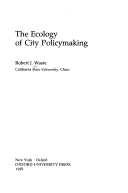This work presents a new and thorough way of analyzing urban public policy. The author has created a theoretical "life-cycle" of the policy-making process in American cities, which is used to explain several crucial aspects of urban policy formulation. These aspects include how issues emerge and are placed on the agenda of local government, and how the age of cities affects the process and content of policy-making. Waste's ecology model highlights the limitations and weaknesses of the process through which urban problems such as crime, inadequate state schools, aging infrastructure, pollution, poverty, and toxic waste disposal are addressed. This...Read more
This work presents a new and thorough way of analyzing urban public policy. The author has created a theoretical "life-cycle" of the policy-making process in American cities, which is used to explain several crucial aspects of urban policy formulation. These aspects include how issues emerge and are placed on the agenda of local government, and how the age of cities affects the process and content of policy-making. Waste's ecology model highlights the limitations and weaknesses of the process through which urban problems such as crime, inadequate state schools, aging infrastructure, pollution, poverty, and toxic waste disposal are addressed. This study bridges two important areas of study by providing both theoretical and case-study links between the fields of public policy and studies of urban politics.
- ISBN10 0195043138
- ISBN13 9780195043136
- Publish Date 11 May 1989
- Publish Status Out of Print
- Out of Print 4 December 1992
- Publish Country US
- Imprint Oxford University Press Inc
- Format Hardcover
- Pages 234
- Language English

